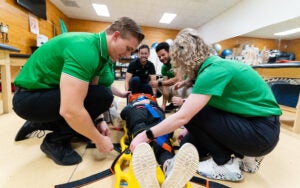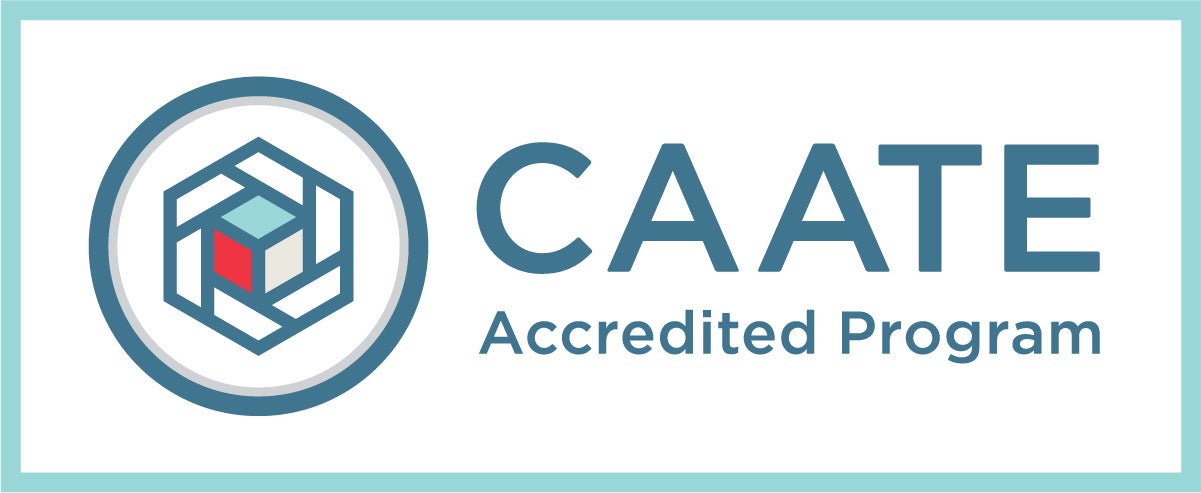 Continuing with the 2025-2026 academic year, the program is organized in a 3 + 2 and 4+2 structure. This means that during the student’s first three years at Marshall University he/she would be taking the required MU core courses in addition to those courses that are required to apply to the ATP including: Anatomy, Physiology, Biology, Physics, Chemistry, Kinesiology, Exercise Physiology, Nutrition, Personal Health/ Wellness, Medical Terminology, Statistics, First Aid & CPR, Sociology, and Introduction to Athletic Training. During these first three years, students could also elect to take pre-requisite courses that are needed to apply to Physical Therapy, Occupational Therapy, Physician’s Assistant, or Medical School. At the end of this three year period and assuming that all the ATP admission requirements have been met, Athletic Training majors would then apply to the Professional Master of Science in Athletic Training Program. Once admitted, students will have two additional years to complete all the ATP class and clinical requirements and would graduate with the Master’s degree. So, in a 5-year period, students can finish the ATP with a Master’s degree. Students presently enrolled at Marshall and having completed the ATP application requirements by the spring 2026 semester should apply at this time. Information on the ATP application process, as well as the documents that need to be completed, can be found here.
Continuing with the 2025-2026 academic year, the program is organized in a 3 + 2 and 4+2 structure. This means that during the student’s first three years at Marshall University he/she would be taking the required MU core courses in addition to those courses that are required to apply to the ATP including: Anatomy, Physiology, Biology, Physics, Chemistry, Kinesiology, Exercise Physiology, Nutrition, Personal Health/ Wellness, Medical Terminology, Statistics, First Aid & CPR, Sociology, and Introduction to Athletic Training. During these first three years, students could also elect to take pre-requisite courses that are needed to apply to Physical Therapy, Occupational Therapy, Physician’s Assistant, or Medical School. At the end of this three year period and assuming that all the ATP admission requirements have been met, Athletic Training majors would then apply to the Professional Master of Science in Athletic Training Program. Once admitted, students will have two additional years to complete all the ATP class and clinical requirements and would graduate with the Master’s degree. So, in a 5-year period, students can finish the ATP with a Master’s degree. Students presently enrolled at Marshall and having completed the ATP application requirements by the spring 2026 semester should apply at this time. Information on the ATP application process, as well as the documents that need to be completed, can be found here.
The Professional Master of Science in Athletic Training Program (PMSATP) at Marshall University prepares students for entry into athletic training, medicine, physical therapy, and other allied health and professional fields. Near the completion of this program, the student has the opportunity to sit for the Board of Certification (BOC) Examination as a result of the program’s CAATE-accreditation status.
What You Need To Know:
- The curricular plan for students beginning the professional master of science in athletic training program in summer 2025.
- 3 + 2 Plan of Study
- Application Packet
The Professional Master of Science in Athletic Training Program (MSATP) at Marshall University prepares students for entry into athletic training, medicine, physical therapy, and other allied health and professional fields. Near the completion of this program, the student has the opportunity to sit for the Board of Certification (BOC) Examination as a result of the program’s CAATE-accreditation status.
MISSION:
The mission of the PMSATP at Marshall University is to meet the academic and clinical education needs of individuals desiring to become BOC-certified athletic trainers. This mission is accomplished through curricular planning, along with faculty and preceptor organization, in order to educate each student about the theoretical and clinical skills necessary to work effectively with the physiological, psychological and biomechanical aspects of injury, illness and performance regarding physically active patients. The MSATP provides education and services for a society that is open, complex, demanding, and evolving. To this end, the PMSATP seeks to achieve the following goals:
- Prepare students to pass the Board of Certification Examination. Eighty percent or higher overall exam pass rate.
- Prepare students for professional practice by demonstrating the Foundational Behaviors of Professional Practice as identified by the 5th edition of the Competencies in Athletic Training (i.e., Primacy of the Patient, Team Approach to Practice, Legal Practice, Ethical Practice, Advancing Knowledge, Cultural Competence, and Professionalism).
- Prepare students for entry into the Athletic Training workforce in any chosen clinical setting, including entrance into professional schools and advanced graduate level education.
- Present students with the didactic, psychomotor, and affective experiences that will lead them to being able to exercise sound ethical judgment, achieve satisfying careers, and make positive contributions to their communities.
- Participate in the continuing development of practicing athletic trainers through the development and dissemination of new theories, concepts, and practices.
- Increase the Athletic Training body of knowledge by providing opportunities to conduct original research and dissemination of results of this result related to athletic training.
- Cooperate with individuals and clinicians, both on campus and off campus, to provide enhanced educational and clinical opportunities for students.
- Provide educational and service resources to West Virginia, Tri-State Region, and nationally.
Program Objectives and Outcomes:
The PMSATP curriculum is designed to prepare the student to first meet and then become proficient in the Competencies in Athletic Training identified in the current version of this document. To this end, the PMSATP has identified the following eight program outcomes:
- The student will apply clinical reasoning skills throughout the physical examination process, and will assimilate the acquired data in order to select the appropriate assessment tests, formulate a differential diagnosis, and determine an appropriate treatment plan or referral to other healthcare professionals.
- The student will adapt therapeutic interventions using clinician- and patient-based outcome measures with the consideration to the stage of healing and treatment goals, thus maximizing the patient’s participation and health-related quality of life.
- The student will adapt evidence-based and best practice standards when making clinical decisions and critically examining athletic training practice.
- The student will integrate strategies and programs to reduce the incidence and/or severity of injuries and illnesses, as well as optimize their patients’ overall health and quality of life.
- The student will be able to evaluate and construct management strategies for patients with acute injuries and illnesses.
- The student will identify, adapt to, and abide by location, state, and national governmental regulations, as well as the regulation of the appropriate professional organizations; in order to display sound moral and ethical judgment in the practice of Athletic Training.
- The student will be able to determine if a patient is exhibiting abnormal social, emotional, and mental behaviors, and then refer the patient to other healthcare providers as necessary.
- The student will be able to perform within the context of a healthcare system. Integral to this function is an understanding of risk management, healthcare delivery mechanisms, insurance, reimbursement documentation, patient privacy, and facility management.
9. The student will gain experience working with diverse populations which includes but limited to: sex, race, age, disabilities/abnormalities, and socioeconomic status.
Thank you for your interest in the Professional Master of Athletic Training Program at Marshall University. We look forward to receiving your application during the upcoming academic year and answering any questions you may have.

